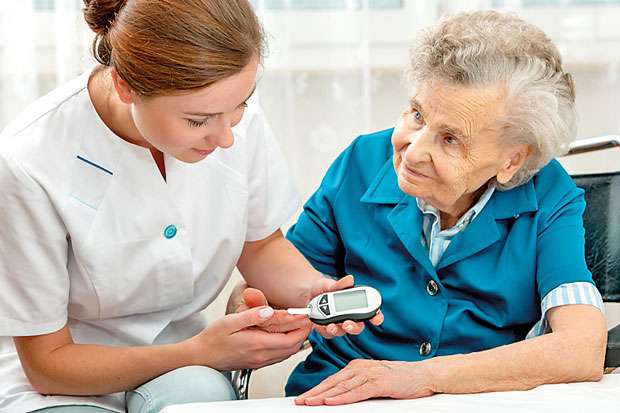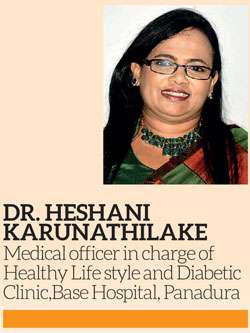16 Nov 2018 - {{hitsCtrl.values.hits}}

 World Diabetes day falls on November 14 and this year “Diabetes and family” has been chosen as the theme. Diabetes Mellitus (DM) is the major non communicable disease in Sri Lanka and worldwide. According to the International Diabetes Federation (IDF) currently 415 million adults have Diabetes and it is estimated that it will increase up to 642 million by 2040. To enlighten our readers on this topic we decided to speak to Dr Heshani Karunathilake, Medical officer in charge of Healthy Life style and Diabetic Clinic at Base Hospital, Panadura.
World Diabetes day falls on November 14 and this year “Diabetes and family” has been chosen as the theme. Diabetes Mellitus (DM) is the major non communicable disease in Sri Lanka and worldwide. According to the International Diabetes Federation (IDF) currently 415 million adults have Diabetes and it is estimated that it will increase up to 642 million by 2040. To enlighten our readers on this topic we decided to speak to Dr Heshani Karunathilake, Medical officer in charge of Healthy Life style and Diabetic Clinic at Base Hospital, Panadura.
What is Diabetes Mellitus?
There are two types of DM namely Type 1 and Type 2. Type 2 DM is mainly seen in adults and it is due to the low levels of Insulin secreted by the pancreas leading to elevated glucose level in blood. Insulin is needed for the uptake of glucose from the blood into the cells to synthesize energy. If Insulin is low, tissue cells can’t take glucose from the blood and thus, blood glucose level rises. This distorted mechanism is called Diabetes Mellitus.
Diabetes level
Normal fasting blood sugar level should be less than 100 mg/dl. If it is more than 126 mg/dl, it is considered as having Diabetes. Between the levels of 100 mg /dl to 126 mg/dl is pre Diabetes and they are at risk of developing DM. Long-term blood sugar control (for 3 months) could be assessed by HbAIC. If the level is below 5.7% it is normal and more than 6.5% is considered as having a poor control. The prediabetics will have values in between. Risk factors for Diabetes could be categorised into 3 groups namely non modifiable, modifiable and behavioral risk factors. Non modifiable risk factors are age, gender and hereditary factors with modifiable risk factors being overweight which raises blood pressure and cholesterol. Unhealthy eating, physical inactivity, tobacco use and alcohol consumption are the behavioural risk factors. By Lifestyle modification one can minimise these risk factors.
Everyone can get a check-up
Today every hospital has established a healthy life style clinic. Anybody can walk into these clinics and get screened for non-communicable diseases. At these clinics Body Mass Index (BMI), blood pressure, breast, eye, heart, lungs, thyroid, examinations are done. Blood sugar and cholesterol levels are also measured. The cardiovascular risk is assessed and those who are at high risk are referred to specialised medical clinics. Medical management and long-term follow-ups are carried out at the medical and Diabetic clinics.
Following are commonly asked questions.
What are the complications of blood sugar damage?
Raised blood sugar damages many organs of the body leading to complications such as Retinopathy, Diabetic kidney disease and neuropathy. To detect these complications at an early stage, every diabetic patient should be screened annually, and it is done at diabetic clinics. Yearly screening of diabetic patients include eye examination by an Ophthalmologist, investigations such as HbAIc, lipid profile, urine for microalbumin, serum creatinine. These blood investigations will help to detect whether diabetes is causing ill effects on the eyes and the kidneys. Monofilament examination of foot could detect the involvement of nerves due to poor control of blood sugar.
What are the observations?
Diabetic patients are educated and motivated on a diabetic diet, the importance of exercises and stress relieving methods. They are also made aware of complications, importance of regular medications and features of low and high glucose levels called hypoglycaemia and hyperglycaemia respectively.
Diabetic patients should make every effort to drop calories and should consume 3 main meals and 3 snacks in-between.It is advised to take the last snack for the day at 10 pm or otherwise with medications. Taking the last meal or snack of the day very early could lead to low blood sugar levels during sleep.
Physical exercise
They should engage in physical exercises for at least 30 minutes per day for 5 days of the week. Walking, swimming, riding bicycles are recommended exercises for these patients. They also should be in a good mental state and engage in recreational and spiritual activities which are beneficial.
Every diabetic patient should make follow-ups at a clinic once a month and their fasting blood sugar and post parandial blood sugar (2 hours after meal) need to be assessed monthly. It can be assured that if a diabetic patient maintains his/her blood sugar level within a normal range there is potential to lead a normal life sans complications. Leading a normal life is possible if you can discipline yourselves and follow the instructions of the doctor. Usually it is not the drugs that cause complications, but the uncontrolled sugar levels due to a irregular haphazard way of taking drugs coupled with the poor diet control.
22 Dec 2024 1 hours ago
22 Dec 2024 1 hours ago
22 Dec 2024 1 hours ago
22 Dec 2024 6 hours ago
22 Dec 2024 8 hours ago